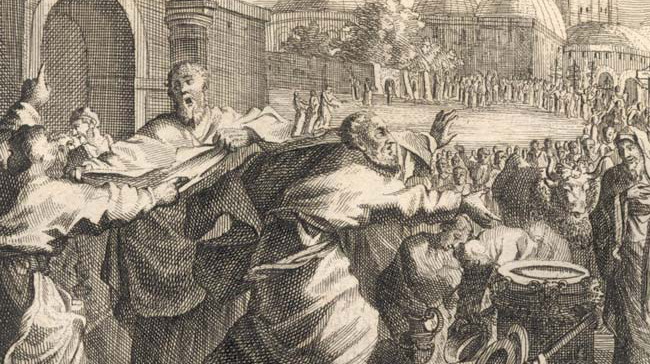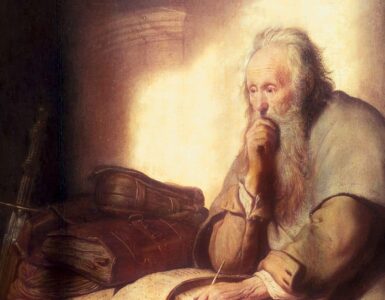On the Fifth Sunday of Easter, here is a very important question: what is our reaction to what Paul and Barnabas tell us today? They tell us that it is necessary for us to undergo many hardships to enter the Kingdom of God. (Acts 14:22)
Before we answer that question, and point out our reaction to those inspired words, let me remind all of us that our God is the God of the living. Being the God of the living, today, he uses Paul and Barnabas (who are glorious parts of the Body of Christ) to bring to us his message of concern and love.
It is necessary for us to undergo many hardships to enter the Kingdom of God.
What is our reaction? “Oh, how I wish it weren’t true!” or “Don’t they have anything uplifting to convey to us?”
As it is, all must suffer. Obviously, the poor suffer; so, do the weak, the sick, the aged, the marginalized, the defenseless. But also, those who, according to the established and well-publicized standards of this world should be happy and care-free because, at least on paper, they have got all that one needs to be happy. Which segment of society gets most of the litigations? Theirs! Who worries about getting robbed or kidnapped? They do. All, even the innocent, suffer, even the good, the honest, including those who go by the book, are law-abiding, religious, pious people, as well as those of strong faith.
But why? Because this world is ailing; the world is fading away; the world is wounded by sin; and sin unleashes evil. And evil is blind; and evil strikes, randomly, anyone, anywhere, anyhow, anytime.
It is necessary for us to undergo many hardships to enter the Kingdom of God.
There is no way of avoiding it. We could be fortunate, lucky for a while, even a long stretch but, eventually, it will be our turn to suffer. Hence, in this unavoidable predicament, can we face trials and tribulations on our own?
If we are realists, we can give the answer immediately. We already know that it is impossible. What about we working with God? Certainly, but with a lot of doing, with plenty of goodwill on our part.
In today’s gospel passage we find both an unusual version of the good news, and the reason why, even with God on our side, handling suffering and trials is very hard. It is very shockingly odd that Jesus says: “Now is the Son of Man glorified.” (John 14:31)
Judas’ exit from the Upper Room set in irreversible motion the final hours of Jesus on this earth; he considered himself GLORIFIED! Where is the glory? Judas’ betrayal sent Jesus to unspeakable torture, to an excruciating passion, to a shameful death on the cross.
Where is the glory? Who would be so insane as to lead us to believe that glory begins with terrible suffering? Well, it is Jesus himself, Jesus the Paschal Lamb making this mysterious, shocking statement. It is as if the template of the Word that God wants to do with us, today, is summarized in these words: “It is necessary for us to share fully in the Paschal Mystery of passion, death and resurrection to enter into the Kingdom of God. Yes, passion, death, resurrection and glorification.
We cannot achieve this alone. But with God’s help? Possibly. Ideally, it is done with God’s help within a community of faith.
In that Upper Room Jesus creates his first community of faith, his “Family.” Now, he calls us “My children.” (John 13:13)
So much tenderness, so much closeness, so much intimacy!
Paul and Barnabas understand the full impact of this term of endearment “my children,” and because of such appreciation, on the way back from Lystra and Iconium and Antioch, stopping at in our town, they encourage us and exhort us to persevere in the faith. It is the faith of believing in the folly of all follies. I.e., that the glory of God’s Kingdom ought to begin in trials and tribulations.
Right after calling us “my children” Jesus gives us the new commandment of loving each other as he loved us on the cross.
Then, immediately after issuing such daunting order, realizing the human impossibility required, he gives us his flesh and blood to consume. Thus, we become truly “his children,” his community, his Family. Still weak, still fragile, still prone to relapses, still easily frightened, yet thrusted toward accomplishing what is possible only in him within the community of faith.
Hence, let us find the necessary amount of time, on this very day, to see how our trials and tribulations which are so personal, so immediate, so real to us, so etched in our minds and so engraved in our hearts are also so common, so ordinary, so plain, so well-known to scores of people.
Well, precisely those trials and tribulations cannot overwhelm us anymore. Past the group of our loved ones, past our loneliness and isolation there is the community whom Jesus created in our town. We shall, then, be humble enough and accept her example of Christian living, her prayers, her support, her closeness, her help and, at the same time, we shall pledge to do the same ourselves for anyone in need. We shall do it with humility; we shall do it with hope; we shall do it with the certainty of the glory that has already been assigned to each one of us, at home, in heaven.


























